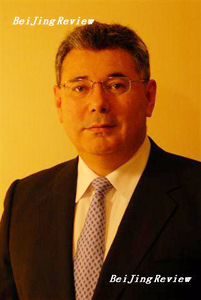|

Jeremy Su's resume glows: President, Hypercom Corporation Asia-Pacific; General Manager, Sun Microsystems China; President, Bull Information Systems Greater China Operation, et cetera, et cetera.
But thanks to being laid off from Hypercom because of cost cutting, his heart, formerly crippled by his juggernaut career, is learning to beat again to the cadence of a balanced life and to the rhythm of romance.
When he's not learning to salsa dance, Su is furnishing his new house in Beijing and considering re-marrying.
Su regrets what happened to his marriage the first time around, a matter so apparent when we met at an elegant restaurant below his hotel apartment.
Basking in the pleasant atmosphere of bonsai and the most luxurious Beijing element-quiet-I asked Su what the happiest moment of his life was.
He smiled ephemerally, and answered, "The most miserable experience in life was getting divorced with my ex-wife."
His demeanor quickly changed from being a portly barrel of self-effacing humor to that of a deep well full of sadness.
"She was my first girlfriend, and we once led a happy life with our two children," Su recalled.
But due to a mounting workload and his desire for success, Su scuttled his family for his version of the American Dream.
It's a phenomenon that happens far too often, revealing a darker, perverted side of this fantasy that could lead China's hardworking nouveau riche-foreigners included-to the depths of misery if they're not careful.
Winning or losing?
Born of a Chinese father and American mother, Su was raised in China but educated in the United States. One day in 1980, Su observed his two passports in hand when he had to decide his nationality for good.
He chose the U.S. passport because "it was convenient to travel with a U.S. passport, and that was when I decided my nationality."
While working for Sun as general manager and later as corporate director, Su seldom had a week that was marked "travel free."
"When I worked as president and corporate director of Taiwan operations of Sun from 1992 to 1994, I had to go to the United States headquarters every three months with the rest of the time flying from this country to that country."
During that period of time, in the region Su helped to turn Sun around, boosting revenues from $24 million to $80 million per year from the combined operations of Sun and its partner business.
But his family suffered.
Su's experience correlates with the results of a landmark study published in the November 2003 issue of Psychological Science. The first of its kind, it assessed the importance of financial success to more 12,000 college freshmen. About 19 years later, it probed their goal attainment and subjective well-being.
"The negative consequences [of the goal of financial success] were particularly severe for the domain of family life," wrote lead author, Carol Nickerson, a psychologist with the University of Illinois at Urbana-Champaign. "The stronger the goal for financial success, the lower the satisfaction with family life, regardless of household income. Aspiring to and achieving the American Dream of financial success may have a dark side."
| 